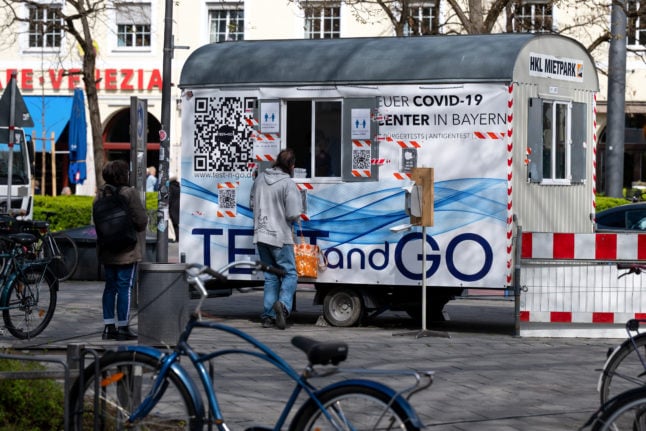According to the Health Ministry’s paper detailing Germany’s autumn Covid strategy, taxpayer-funded antigen Covid-19 tests will in future only be free to patients with Covid symptoms as well as some other selected groups.
The plans were sent on Tuesday to the health ministers of the federal states, ahead of meetings being held on Wednesday and Thursday.
Free Covid tests – also known as Schnelltests – are available at no cost to everyone in Germany, including tourists, until the end of June.
However, they are not cheap – the federal government has reportedly spent more than €10.5 billion on free Bürgertests during the pandemic. Authorities also believe the free testing strategy has resulted in fraud of up to €1.5 billion.
On Tuesday evening, Lauterbach, of the Social Democrats, told German broadcaster ARD that he wants to see the tests “better controlled”.
READ ALSO: Will Germany keep free tests after June?
Under the Health Ministry’s plans, free antigen Covid tests would still be available in the following situations:
– For people with Covid symptoms.
– As part of preventive testing in nursing homes and hospitals.
– For children and people with increased contacts, for example before large events.
– For anyone who cannot get vaccinated for medical reasons, for example during pregnancy in the first trimester.
– During outbreaks in Covid hotspots.
– For refugees fleeing war in Ukraine.
It’s not clear how this would work in practice. If the plans go ahead, it would mean that anyone who doesn’t have symptoms but wants to get a rapid Covid test, and who doesn’t fall into one of these categories, would have to pay for a test themselves at a centre or buy a self-test kit.
PCR tests are already generally only available free-of-charge to people with Covid-19 symptoms, or vulnerable groups. A doctor or other health professional can arrange this for patients, and the tests are then covered by health insurance.
The Health Minister says in the proposals that Germany’s easily accessible testing infrastructure – including in pharmacies – should be maintained.
However, the federal government wants to pay the test centres less money per rapid antigen test and PCR test in future.
“The total costs are to be reduced by about half,” the Health Ministry writes in its strategy paper. The amendment to the test regulation is to be made by the end of June, the ministry adds.
READ ALSO: The Covid rules in place across German states
What’s the reaction?
Many people want to see free tests continue to be available in Germany.
The Stiftung Patientenschutz (Patient Protection Foundation), for instance, is calling for free tests to be extended beyond June 30th.
Meanwhile, Green Party health expert Janosch Dahmen told Deutschlandfunk radio: “We are in favour of having widely available free tests in the population also in autumn.”
Yet others support a change in testing strategy.
The chairman of the National Association of Statutory Health Insurance Physicians (KBV), Andreas Gassen, said: “We should put a stop to random Bürgertests as soon as possible – they are of very little use and cost a lot.”
The proposals will be discussed at the talks between health ministers this week.
READ ALSO: German states seek powers to enforce tougher Covid rules in autumn



 Please whitelist us to continue reading.
Please whitelist us to continue reading.
I have a question for the good people at the local
Authorities also believe the free testing strategy has resulted in fraud of up to €1.5 billion. <– Why is this 1 sentence in a news article and not news by its own right. People are stealing 1.5 billion from tax payers pockets. Why is no one enraged by this?
Thats at least 18€ has been taken from my pocket and given to a criminal. Thats the fraud they are willing to admit. Which means its probably alot worse. But don't worry, now only people with symptoms can get a free test. A symptom of Omicron is a headache. Hmm. I cannot see any scope for fraud there. Nope. None. I wonder has anyone else taken advantage of easy fraud without consequences during this period?